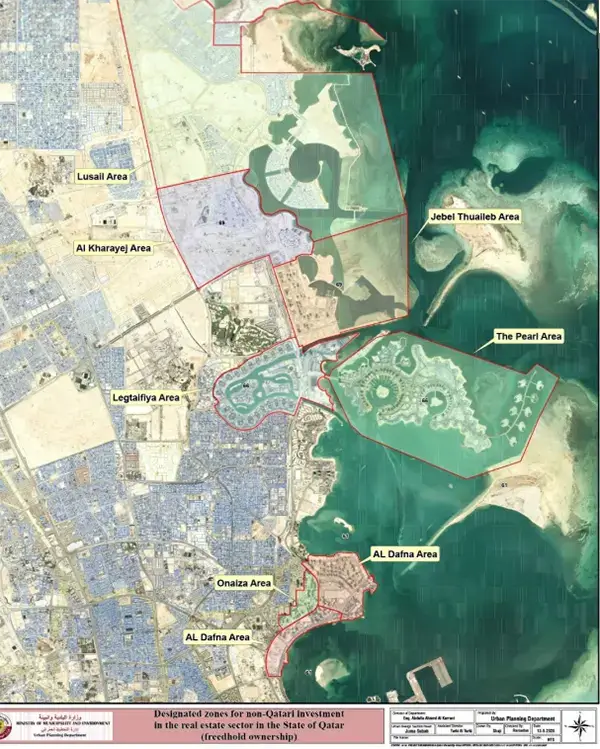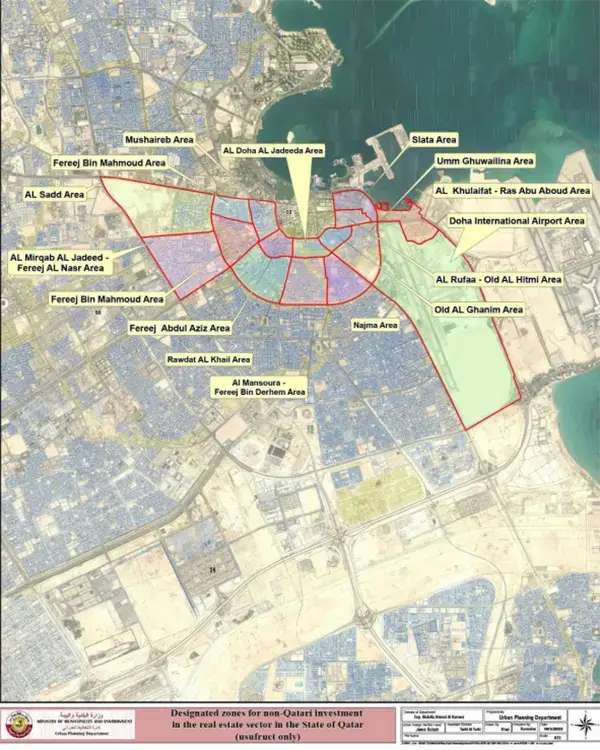Qatar’s real estate market has grown rapidly in the past decade, attracting expats with major infrastructure projects, a strong economy, and events like the FIFA World Cup 2022. Beyond modern developments, it offers a high-quality lifestyle, tax-free income, and a safe environment. This guide covers everything expats need to know about buying property in Qatar —legal rules, top investment areas, ownership options, and the full buying process.
Can Expats Buy Property in Qatar?
Yes, they can. expats can buy property in Qatar . In 2018, Law No. 16 was enacted to permit non-Qataris to own or utilize real estate. Cabinet Resolution No. 28 of 2020 expanded on this by identifying zones where expats can invest and even gain residency benefits through property ownership.
Can foreigners buy property in Qatar?
Absolutely, within designated areas.
Freehold vs. Leasehold Areas
Expats can buy freehold property in Qatar in specific areas or opt for long-term leaseholds. Freehold property in Qatar gives full ownership of the unit and land, while leaseholds (also called usufruct) typically span up to 99 years and allow use without land ownership.
Popular Zones for Expats to Buy Property in Qatar:
1- The pearl
2- West bay
3- Al Dafna
Freehold Areas in Qatar
1- Westbay zone 66
2- The Pearl zone 66
3- Al Khor Resort zone 74
4- Al Dafna zone 60
5- Al Dafna zone 61
6- Onaiza zone 63
7- Lusail zone 69
8- Al Khuraij zone 69
9- Fox Hills zone 69
Usufruct areas in Qatar
1- Msheireb zone 13
2- Fereej Abdul Aziz zone 14
3- Al Doha Al Jadeeda zone 15
4- Old Al Ghanim zone 16
5- Al Rufaa & Old Al Hitmi zone 17
6- Al Salata zone 18
7- Fereej Bin Mahmoud zone 22
8- Fereej Bin Mahmoud zone 23
9- Rawdat Al Khail zone 24
10- Al Mansoura & Fereej Bin Durham zone 25
11- Najma zone 26
12- Umm Ghuwailina zone 27
13- Al Khulaifat zone zone 28
14- Al Sadd zone 38
15- Al Mirqab Jadeed & Fereej Al Nasr zone 39
16- Doha International Airport Area zone 48
Are expats allowed to own properties in different areas of Qatar?
Expats in Qatar can own multiple properties—like apartments, villas, and commercial units—in designated areas such as The Pearl and Lusail. But outside these zones, they're generally only allowed to purchase one compound villa
Benefits of Owning Property in Qatar as an Expat
- High ROI: Areas like Lusail and The Pearl offer the best investment in Qatar for expats.
- Tax-Free Income: There is no annual property tax in Qatar.
- Legal Security: The legal framework ensures your rights are protected.
Legal & Financial Requirements
- Eligibility: Expats of any nationality can buy property in Qatar for expats in designated areas.
- Minimum Value:
- QAR 730,000 = Standard Residency
- QAR 3.65 million = Permanent Residency + Perks
- Required Documents: Passport, proof of income/funds, signed agreements.
- Financing Options: Local banks offer mortgages with varying terms.
- Ownership Transfer: Finalized through the Real Estate Registration Department.
Qatar Residency by Buying Property
- Investing over QAR 730,000 can secure you and your family a residence permit.
- For QAR 3.65 million+, you can qualify for permanent residency in Qatar for expats.
- Benefits include access to healthcare, education, and long-term stay rights.
Key Considerations Before Buying
- Market Trends: Research before buying property in Qatar to ensure long-term gains.
- Management: If you’re buying to rent, consider hiring a property manager.
- HOA Rules: Check building or compound policies.
- Exit Strategy: Choose locations with strong resale demand.
Living in Qatar as a Property Owner
- Safe & Modern: Qatar is one of the safest and most modern countries in the region.
- Quality of Life: Top schools, hospitals, and leisure options are easily accessible.
- Cost of Living: Long-term, owning can be more affordable than renting. Your Legal Roadmap to Property Ownership in Qatar as an Expat.
Qatar has opened its real estate market to expats through Law No. 16 (2018) and Cabinet Resolution No. 28 (2020), allowing foreigners to own or lease property in areas like The Pearl, Lusail, West Bay Lagoon, and Al Khor. Expats can enjoy freehold or 99-year lease rights, with no nationality restrictions, though legal processes require Arabic documentation and registration through the Ministry of Justice. A property worth over QAR 730,000 grants residency; QAR 3.65 million may qualify for permanent residency, offering added benefits. While challenges like legal nuances and off-plan risks exist, local guidance is key. With post-World Cup development and falling prices, now may be an ideal time to invest.
Mortgage and Financing Options for Expats
Expats in Qatar can access home loans from major banks such as Qatar Islamic Bank, HSBC, Commercial Bank of Qatar, and Masraf Al Rayan. Most lenders require a down-payment of 20–30%, proof of steady income, and valid residency. Both conventional mortgages and Islamic (Sharia-compliant) financing options are available. The process typically involves pre-approval, a property valuation, and final registration with the Real Estate Registration Department. Most paperwork, including contracts and applications, will be in Arabic, so professional assistance is highly recommended.
What Are the Steps to Buying Property in Qatar?
- Choose your preferred location (e.g., Lusail, The Pearl).
- Hire a licensed real estate agent.
- Shortlist and view properties
- Negotiate the terms.
- Sign a reservation agreement.
- Transfer ownership through official channels.
- Pay fees and take ownership.
Conclusion
So, can expats buy property in Qatar ? Absolutely. From luxury waterfront apartments to smart investment options, buying property in Qatar for expats is easier than ever. It’s not just a wise financial decision; it also serves as a pathway to obtaining Qatar residency through investment. Whether you're looking for a freehold property for sale in Qatar or a leasehold option in a high-growth zone, the opportunities are real and rewarding.
If you're considering settling down or making the best investment in Qatar for expats , start exploring the market now. Work with licensed agents and stay informed about property laws to make the most of your investment.
FAQs
Can the right to use and benefit from property be inherited by non-Qataris?
Yes, the right granted to non-Qataris to use and benefit from property (usufruct) is inheritable. It does not expire upon the owner's death and can be passed on to their heirs.
Can I buy property with my spouse?
Yes, joint ownership is legal and common among expats.Do I lose my residency if I sell?
Yes, unless you reinvest in another eligible property.Are there taxes or service charges?
No property tax, but there may be HOA or building maintenance fees.Can I buy off-plan?
Yes, but always ensure a reputable, licensed developer.
Related Blogs





